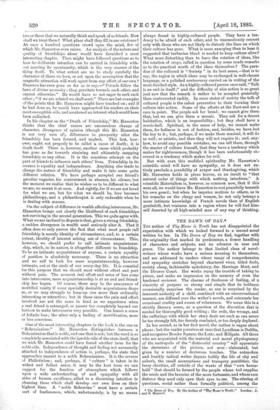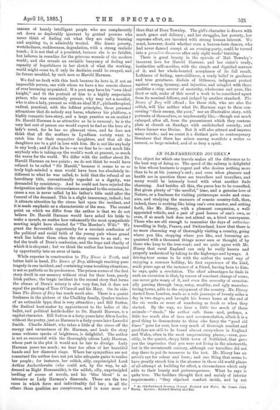THE DAWN OF DAY.*
Tax author of Thy Name is Truth has not disappointed the expectation with which we looked forward to a second novel written by her. In The Dawn of Day we find, together with the originality that marked its predecessor, a firmer handling of characters and subjects, and an advance in ease and grace. The author belongs to that limited class of novelwriters whose works have a serious meaning to themselves, and are addressed to readers whose range of comprehension and sympathy stretches beyond chartered vices, titled fools, society slang, fashionable upholstery, the Marriage Mart, and the Divorce Court. Her works repay the trouble of taking to pieces, and make an impression on the memory of even the hardened reviewer. The charms of freshness of feeling, of a sincerity of purpose so strong and simple that its boldness occasionally surprises the reader, as one is surprised by the innocent audacity of a child, combined with an unconventional manner, are diffused over the writer's novels, and extenuate her occasional crudity and excess of vehemence. We mean this in a strictly literary sense, as a question of the discretion that is needed for thoroughly good writing ; the evils, the wrongs, and the sufferings with which her story deals are such as can never be too strongly felt, too fiercely combated, or too deeply deplored.
In her second, as in her first novel, the author is vague about places ; but the reader perceives at once that Lyndham is Dublin, and recognises Brooke Square, the Lotts, and Millgate. All those who are acquainted with the material and moral physiognomy of the metropolis of the " distressful country " will appreciate the cleverness of the picture, not over elaborated, but given by a number of dexterous touches. The outspoken and frankly radical writer depicts boldly the life of city and suburb, the small assumptions and trumpery gentilities, the fussy charities, all outside of the wants of that " QW12 household " that should be formed by the people whose toil supplies the needs and the luxuries of the more fortunate, and whose sore distress they need only open their eyes to see. The stirring of questions, social rather than formally political, among the
masses of keenly intelligent people who are complacently set down as deplorably ignorant by genteel persons who never think of finding out what they are really learning and aspiring to, is admirably treated. She draws poverty, wretchedness, recklessness, degradation, with a strong realistic touch ; it is not that of a pessimist, because she is no fatalist, but believes in remedies for the grievous wounds of the modern world ; and she reveals an enviable buoyancy of feeling and capacity of hopefulness in her sketch of what the working. world might come to, if only its destinies could be swayed, and its future moulded, by such men as Harold Harman.
We find no fault with this book because its hero is, if not an impossible person, one with whom we have a too remote chance of ever becoming acquainted. If a poet may have his "own ideal knight," and fit the portrait of him to a highly respectable prince, who was essentially prosaic, why may not a novelist, who is also a lady, present us with an ideal M.P., philanthropical, radical, practical, with the loftiest principles, those personal attractions that do nobody any harm, whatever his platform, a highly romantic love-story, and a large practice as an oculist ? Dr. Harold Harman is as attractive as he is unusual ; he is the very last sort of person one would expect to find as the hero of a lady's novel, for he has no pleasant vices, and he does not think that all the mothers in Lyndham society want to catch him for their respective daughters, and that all the daughters are to a girl in love with him. He is not like anybody in any book; and if also he be—as we fear he is—not much like anybody who is taking-up the world's work at present, so much the worse for the world. We differ with the author about Dr. Harold Harman on two points ; we do not think he would have refused to be called " Sir Harold," because it seems to us so truly high-minded a man would have been too absolutely indifferent to what he was called, to hold that the refusal of an hereditary title, conventionally regarded as a dignity, was demanded by consistency. And he could not have rejected the designation under the circumstances assigned to the occasion, because a son is never called by his father's title until after the funeral of the deceased. This is a slight inaccuracy, indeed ; but it attracts attention by the stress laid upon the incident, and it is made emphatic as a characteristic of the man. The second point on which we differ from the author is that we do not believe Dr. Harold Harman would have asked his bride to make a speech, no matter how vehemently the most sympathetic meeting might have shouted for "The Member's Wife." We grant the favourable opportunity for a succinct confession of the political and social faith of the young pair whose grand work lies before them when the story comes to an end ; we feel the truth of Dora's confession, and the hope and charity of which it is eloquent ; but we think the author has been tempted by opportunity into an error of taste.
While superior in construction to Thy Name is Truth, and better held in hand, The Dawn of Day, although reaching pure tragedy in one incident, and containing some touching situations, is not so pathetic as its predecessor. The prison scenes of the first story dwell in our memory without rival for their keen, purely Irish pathos; the tragic incident in the second story that forms the climax of Dora's misery is also very fine, but it does not equal the parting of Tom O'Carroll and his Mary. On its side lines The Dawn of Day has much merit also. There is a quaint freshness in the picture of the Chalkley family, Quaker traders of an estimable type, that is very attractive ; and Bill Sutton, the Radical boot-maker by appointment to the ladies of the ballet, and political bottle-holder to Dr. Harold Harman, is a capital character. Bill Sutton is a forty-years later Alton Locke, without the poetry, just as Harman is a forty-years later Lancelot Smith. Charlie Abbott, who takes a little of the stress off the energy and earnestness of Dr. Harman, and lends the story some welcome specks of brightness, is delightful. The author is not so successful with the thoroughly odious Lady Harman, whose part in the plot it would not be fair to divulge. Lady Harman poses too much ; we hear too often of her beautiful hands and her diamond rings. Where her sympathies are not concerned the author does not yet take adequate pains to realise her people ; for instance, her selfish, silly, unprincipled Lord Arthur Ascherthwaite (who could not, by the way, be addressed as Right Honourable), is the selfish, silly, unprincipled lordling of scores of novels, and his 'blue blood' is as intrusive as Lady Harman's diamonds. These are the two cases in which force and individuality fail her; in all the others those qualities are conspicuous, and in none more so than that of Dora Townley. The girl's character is drawn with much grace and delicacy ; and her struggles, her poverty, her supreme effort, are invested with strong human interest. We must, however, doubt whether even a heaven-born dancer, who had never danced except at an evening-party, could be turned into a premiere danseuse after only eight weeks' training.
There is great beauty in the episode of Mab Townley's innocent love for Harold Harman, and her sister's ready, instinctive self-sacrifice, with the simple and dignified manner of it, and her whole-hearted acceptance of its full result. Loftiness of feeling, unworldliness, a ready belief in goodness and true greatness, disdain of littleness, indignant protest against wrong, tyranny, and injustice, and mingled with these qualities a crisp savour of austerity, wholesome and pure, like frost or salt, make of this novel a work to be considered apart from its nominal fellows, and judged by another standard. The Dawn of Day will offend ; for those rich, who are also the selfish, will like neither what Dr. Harman says to them concerning "their enemy, the poor," nor an illustrative story, with portraits of themselves, so unpleasantly like,—though not much enlarged, after all, from the presentment which they contemplate at church on Sundays with undisturbed serenity, and whose limner was Divine. But it will also attract and impress many minds ; and we count it a distinct gain to contemporary literature that there has arisen among novelists a writer so earnest, so large-minded, and of so fiery a spirit.



































 Previous page
Previous page